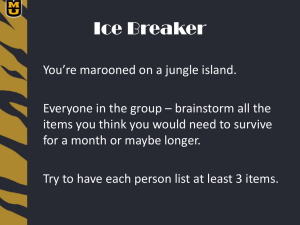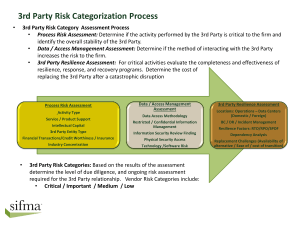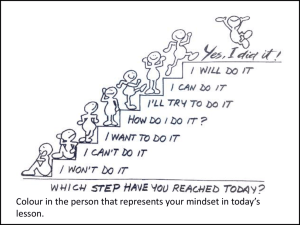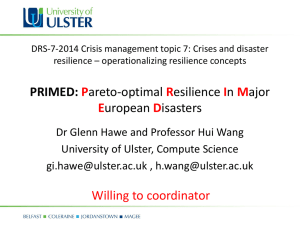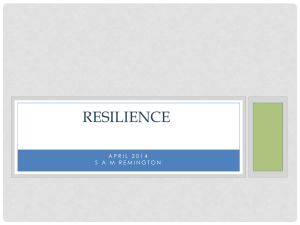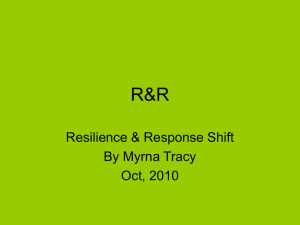Resilience - NHS Education for Scotland
advertisement
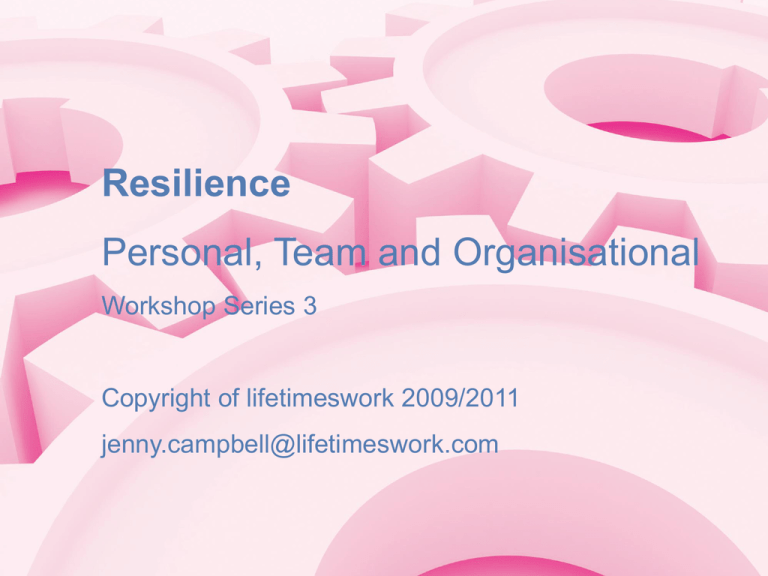
Resilience Personal, Team and Organisational Workshop Series 3 Copyright of lifetimeswork 2009/2011 jenny.campbell@lifetimeswork.com Resilience Workshop Series, Workshop 3 Outcomes • Increased understanding of what drives your organisation’s ups and downs • A clear evaluation of your organisation’s current resilience • Increased understanding of the barriers to your organisation’s resilience • Increased awareness of how the 8 core elements of organisational resilience are connected • A sharing of best practice in helping develop and maintain organisational resilience • A prioritisation of what needs to change now for your own organisation • An action plan of how you take your organisational learnings back into the workplace • Work through how to bring your increased understanding of the organisation’s resilience to help deliver towards your sponsoring organisation’s outcomes Resilience Workshop Series, Workshop 3 Personal, Team and Organisational Our Starting Point lifetimeswork Organisational Resilience OR = Resilience of Top Team + 6 Organisation Factors Consistency Collaborative Culture Learning Culture Emotional contract Prioritisation to reduce stress/workload Sharing difficulties/ambiguity with staff Organisational Resilience What is it? Culture Top Team Senior Team Senior Team Teams Teams Senior Team Senior Team Teams Policies, Structures, Processes Teams Policies, Structures, Processes Policies, Structures, Processes Policies, Structures, Processes Resilience Workshop Series, Workshop 3 Organisational Resilience What is it? Resilience Defined ‘Strategic Resilience is what dynamically prevents the organisation from falling into decline, thus ensuring that a crisis never comes. It therefore includes the capacity to exploit opportunity.’ (Hollnagel & Woods 2006) ‘If I knew where the next challenge will come from, I would be able to defend against it. But it is the challenge I cannot anticipate that we need grassroots resilience capability for. (Anon CEO of USA company) ‘I know it when I see it’ (from ‘The Resilience Organisation’, Liisa Valinkagnas) Resilience Workshop Series, Workshop 3 Organisational Resilience What is it? Strategic Resilience Traditional Resilience The capacity to The capacity to Change without first experiencing crisis Change without a lot of accompanying trauma Take action before it is a final necessity Recover after experiencing crisis Persist in face of threat; not to yield; tenacity Survive trauma From ‘The Resilience Organisation’; Valikangas, 2010 Resilience Workshop Series, Workshop 3 Organisational Resilience What is it? Strategic Resilience Traditional Resilience ; ‘ Fall back’ Used to battle decline, or address opportunities near and long term Used when disturbance is sudden! Capacity to sustain and accomplish strategic change Capacity to create positive surprises Sustainability, flourishing Escalation avoidance Accidence avoidance Robustness Proactive ‘what if’ From ‘The Resilience Organisation’; Valikangas, 2010 Resilience Workshop Series, Workshop 3 Characteristics Adaptive Resourceful Robust Resilience Workshop Series, Workshop 3 Organisational Resilience Characteristics – How? Resourceful Prioritisation Sharing difficulties/ambiguity Adaptive Collaborative Culture Learning Culture Prioritisation Sharing difficulties/ambiguity Robust Emotional Contract Consistency Resilience Workshop Series, Workshop 3 Organisational Resilience Characteristics & How? Resourceful Resilience of Top Team Adaptive Senior Teams Other teams Robust Team Resilience Very early insights Market Organisation Boss’s Boss Team Factors Boss’s Resilience Individual Resilience Resilience Defined Leverage Health Warning! All ideas for Team Resilience are too early to be evidenced Team Resilience Very early insights Team Factors 1. Trust in the team 2. Authority of each team member inside and outside of the team. Includes clarity of role, value and purpose in the team 3. A Compelling Team Purpose 4. Consistency of action. Alignment of Vision/ Values/ Action / Communication 5. Collective capability in 3 areas: Learning/ Perspective/ Pacing Health Warning! All ideas for Team Resilience are too early to be evidenced Resilience Workshop Series, Workshop 3 Characteristics - Adaptive Strategy • is formed with expectations of adjusting, changing • is ‘in discovery’ • is beyond current performance Willing to stop things that are no longer delivering Resilience Workshop Series, Workshop 3 Characteristics - Adaptive Resilience Workshop Series, Workshop 3 Characteristics – Adaptive. Mindfulness Aware of what is happening around and to them => situational awareness Be free of denial, nostalgia, arrogance Embraces diversity to ensure against stuck mindsets Takes realistic view Unlearns & learns Is not hostage to past performance Resilience Workshop Series, Workshop 3 Characteristics - Mindfulness Resilience Workshop Series, Workshop 3 Characteristics - Mindfulness Resilience Workshop Series, Workshop 3 Organisational Resilience How do you efficiently promote positive outcomes of organisation, while limiting negative consequences that are often associated with bureaucratic structures? (how authority is structured) Wayne K. Hoy, (2003) "An analysis of enabling and mindful school structures: Some theoretical, research and practical considerations", Journal of Educational Administration, Vol. 41 Iss: 1, pp.87 - 109 Resilience Workshop Series, Workshop 3 How to promote Organisational Mindfulness Be preoccupied with failure to guard against creeping complacency Be reluctant to simplify and become simple minded Foster situational awareness and reporting of errors Commit to resolving rather than being overcome by errors Defer to expertise not hierarchy (Weick & Sutcliffe, 2006) Resilience Workshop Series, Workshop 3 Organisational Resilience Current Thinking OR = Resilience of Top Team + Senior Teams + Resilience of Middle Management + Consistency + Emotional Contract + Culture = Mindful Collaborative Culture Learning Culture Working within capacity whilst embracing stretch. (Prioritisation) Sharing difficulties/ambiguity with staff Resilience Personal, Team and Organisational Workshop Series 3 Copyright of lifetimeswork 2009/2011 jenny.campbell@lifetimeswork.com Resilience Workshop Series, Workshop 3 Organisational Resilience Past Performance Traps High Success Mediocrity Very low Past Performance Traps High Success Overconfidence Arrogance Undue attribution of merit to self Structural hardening, rigidity Immoderation, escalation of success formula Lost capacity for experimentation Attention complacency Past Performance Traps Mediocrity Conventional thinking Best people leaving Lowered aspirations Refer to other unambitious groups Interest groups perpetuate status quo Control of resources by those who benefit from mediocrity Past Performance Traps Poor performance Caught in failure Threat-rigidity response Extreme risk taking in case survival threatened Inward focus No-one cares, people give up Past Performance Traps: Exercise Consider your organisation’s past performance in relation to the energy graph. What do you notice? What would you like to change? High Success Mediocrity Poor performance Overconfidence Arrogance Undue attribution of merit to self Structural hardening, rigidity Immoderation, escalation of success formula Lost capacity for experimentation Attention complacency Conventional thinking Best people leaving Lowered aspirations Refer to other unambitious groups Interest groups perpetuate status quo Control of resources by those who benefit from mediocrity Caught in failure Threat-rigidity response Extreme risk taking in case survival threatened Inward focus No-one cares, people give up Resilience Personal, Team and Organisational Workshop Series 2 Backup Contact jenny.campbell@lifetimeswork.com Resilience Personal, Team and Organisational Resilience Defined lifetimeswork Resilience Redefined Resilience = (Bounce Back x Speed) + Energy Recovered + (Learning x Application ) Resilience Personal, Team and Organisational Resilience Personal, Team and Organisational Workshop Series 3 Copyright of lifetimeswork 2009/2011 jenny.campbell@lifetimeswork.com


